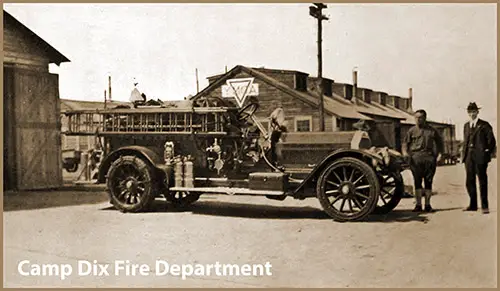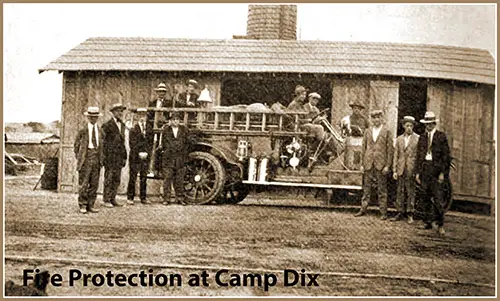The Camp Dix Fire Department

The Camp Dix Fire Department. Camp Dix Described and Photographed by Roger Batchelder, 1918, p. 37. GGA Image ID # 1ce441d579
In any city where the house construction is mainly wood, the danger from fire is great; at Camp Dix, where every building is of wood.
The military city is collected in such a small area, the chances of a general conflagration are not unlikely. A fire department, an adjunct to the quartermaster corps, is stationed at the camp to offset this menace.
This is not merely a fire department in name, comprised of antique equipment or volunteer workers; it is up to a metropolitan department's standard in every sense.
In the first place, every member of the force has had actual fire-fighting experience in city departments. An ex-battalion chief supervises the department. The equipment also is equal to any contingency which might arise.
There are five motor-engines, either of the La France type (as shown in the picture, identical to those used in the cities) or smaller engines with Ford motors.
The alarm system is also like that of an ordinary city. There are engine-houses in five sections of the camp. If an alarm is announced, either by one of the many fireboxes or by telephone, the engine that belongs to the area in danger goes to the scene.
If the fire has gained headway, a siren whistle which everyone can hear for miles, gives the alarm, and the entire department comes to the fire in record time.
The vicinity's military organizations are called out; they work under the direction of the fire chief. Thus every man in the camp is a reserve fireman.
A set of drastic regulations for fire prevention has been drawn up; these are strictly enforced. Hose reels are placed in every part of the camp; fire-extinguishers are in nearly every building.
Thanks to the universal adherence to the rules and the department's excellent work, no serious fires have resulted, and the possibility of any in the future has been reduced to a minimum.
FIRE PROTECTION AT CAMP DIX

Fire Protection at Camp Dix. The Camp Dix News, 15 September 1917, p. 4. GGA Image ID # 1ce4ef69c0
J. W. GODBOLD, Fire Chief, Irwin & Leighton.
Thoughts of war on foreign fields of battle, due to the presence of a constantly increasing number of soldiers at Camp Dix, must not make us lose sight of the fact that we have a common enemy right at our door. That common enemy is fire.
In preparing for warfare against fire, every possibility must be considered, and every possible precaution must be taken in advance. When fire breaks out there is little or no time to stop and think what should best be done.
One has to know. This necessity for instant action is liable to occur at any moment. To meet this contingency, Messrs. Irwin & Leighton have organized a fire department. The force for firefighting comprises a fire chief and eleven firemen.
At present there is one fire station, located in Section No. 4. Here is stationed an American La France automobile pumping engine and hose wagon and two members of Motor Truck Division No. 66 are detailed to operate it. Two additional engines of this type are at present kept in reserve in the garage of the Motor Truck Division.
Each of these engines has a pump that can deliver 750 gallons of water per minute at 120 pounds net water pressure. Each also carries a 45-gallon water tank, the contents of which can be forced through 200 feet of small rubber hose by the main pump, without connecting the engine to a hydrant, and used in place of a stream of chemical solution.
Each engine has carrying capacity for 1,000 feet of 258-inch fire hose and eight men. Each weigh about six tons, when loaded. Ladders, chemical extinguishers and such miscellaneous minor equipment are also carried. These fire engines are the property of the Government and will be used for the permanent protection of the Camp.
A system of water mains and hydrants, designed to supply an adequate amount of water for fire fight ing, in addition to that required for domestic consumption, is being rushed to completion as fast as possible.
Barrels filled with water are placed near buildings and lumber piles. Many chemical extinguishers and thousands of water-filled buckets are distributed throughout the buildings. To these will be added portable water tanks, equipped with hand pumps and fire hose on handcarts distributed along the water mains.
Watch is maintained at the fire station day and night. Fire alarms are received by telephone from the operator at the Camp central telephone switchboard. At the centre of each section of the cantonment construction work is a sentry box containing a telephone. This box is painted red and marked "Fire Alarm Telephone."
Alarms of fire can readily be sent from any section in this manner. Instructions for sending in a fire alarm are as follows: “In case of fire, run to the nearest telephone, call the operator and tell where the fire is. The operator will sound the alarm. Give the location by Section number and tell what kind of building. Always send in the fire alarm first; then try to put out the fire.”
A system of inspection by the fire men has been inaugurated, with a view of reducing the fire risk as much as possible. Any accumulations of rubbish in and around buildings are noted and the proper authorities are notified to remove them.
Fire appliances are inspected daily, water barrels and fire pails are placed and re filled by a special force of men and teams. Special teams and men are also continuously engaged in removing rubbish and waste material. This is taken to a safe place or burned.
Arrangements also have been made to call upon the fire departments of cities near Camp Dix for help in case, of necessity, and, while we earnestly hope that this need will never occur, we know they will do all they can for us in case we need them.
Any fire, no matter how small, may get beyond control. When conditions are right, any fire beyond control may easily develop into a sweeping conflagration. Do not forget this!
And while you are remembering it, remember also how important it is that you send in a fire alarm for every fire, no matter how small a fire it may seem to be. We can't bring our firefighting apparatus and our men to a fire if we are not informed about it. Give us a chance.
